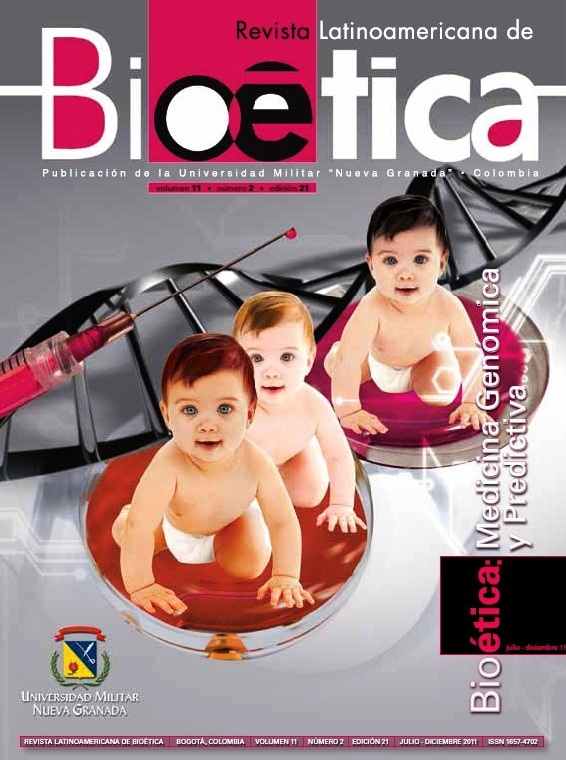Instrumentos usados para medir clima ético en organizaciones de salud
Resumen
El estudio del clima ético se ha convertido en un asunto de obligatorio abordaje para la bioética, que se enfrenta al reto de buscar climas éticos que promuevan la coherencia entre lo que las organizaciones sanitarias dicen ser y hacer y lo que efectivamente son y hacen. Esto con el objeto, entre otros, de reducir los conflictos éticos que se suscitan en los profesionales de la salud cuando ocurren estas diferencias.
El objetivo de este artículo es identificar los instrumentos que han sido usados para medir el constructo “clima ético” en las organizaciones de salud, de manera que sirva a los académicos y a las organizaciones de salud en el diseño de estudios sobre este tópico y les permita identificar sus particularidades.
Los resultados sugieren la necesidad de continuar explorando en un concepto de clima ético que incorpore los
Valores, los principios y los derechos que han de considerarse desde la bioética en la búsqueda de organizaciones que atiendan a los objetivos de las profesiones y los sistemas de salud hoy.
Descargas
Disciplinas:
Bioética, Humanidades, Ciencias Sociales, Ciencias Médicas, Ambiente y sostenibilidadLenguajes:
esReferencias bibliográficas
• Ambrose , M., Arnaud A., Schminke M. (2008) Individual Moral Development and Ethical climate: the influence of person-organization fit on job attitudes. Journal of Business Ethics, 77, 323-333.
• Bahcecik , N., Ozt ürk , H. (2003) The Hospital Ethical Climate Survey in Turkey. JONA’s Healthcare Law, Ethics, and Regulation. 5(4), 94-99.
• Bell , S. E. (2002). Ethical climate in Managed Care Organizations. Nursing Administration Quarterly, 27, 133-139.
• Bishop , L.J.,Cherry , M. N; Darragh , M. (1999). Organizational Ethics and Health Core: Expanding Bioethics to the institutionaI Arena. Kennedy Institute of Ethics Journal. 9, 189-208.
• Cullen , J.B., Victor , B., Bronson , J. W. (1993). The ethical climate questionnaire: an assessment of its development
• and validity. Psychological Reports, 667-674.
• Cullen , J.B., Parboteeah , K. P.; VICTOR, B. (2003) The effects of ethical climates on organizational commitment: A two study analysis. Journal of Business Ethics. 46,1-15.
• Daniels , N. (2006) Equity and Population Health, toward a broader bioethics agenda. Hastings Center R eport, 22-35.
• Daniels , N. (2008) Just Health, meeting health needs fairly. New York:Cambridge University Press.
• Deshpande , S., JOSEPH, J. (2009). lmpact of Emotional Intelligence, Ethical Climate and Behavior of Peers on Ethical
• Behavior of Nurses. Journal of Business Ethics,85,403-410.
• Deshpande , S.P. (1996). The Impact of Ethical Climate Types on Facets of Job Satisfaction: An Empirical Investigation.
• En: Journal of Business Ethics. Vol. 15 No. 6 (jun., 1996); p. 655-660.
• Elci , M, Alpkan , L. (2009) The impact of perceived organizational ethical climate on work satisfaction. Journal of Business Ethics. 84, 297-311.
• Erakovich , R.,Bruce , R., Wyman , S. (2002, marzo 23-26) Preliminary Results: A study of the relationship of ethical climate and organizational culture in public organizations. Prepared for presentation at the American Society for Public Administration National Conference, Phoenix, Arizona. Extraido en junio de 2020 del sitio Web: http:// www.aspaonline.org/ethicscommunity/documents/Ethical% 20Climate%20Paper%20Prelim%20Findings.pdf .
• Ferrer , J.J., Alvarez , J.C. (2003) Para fundamentar la bioética. (2ª. Edición). España:Editorial Desclée De Brouwer. Gibson, J.L. (2007). Organizational ethics and the management of health care organizations. Healthcare Management Forum, 20,38-41.
• Goold , S.D. (2001). Trust and the ethics of health care institutions. Hastings Center Reports. 31,26-33.
• Hart , S.E. (2005).Hospital ethical climates and registered nurses turnover intentions. En: Journal of Nursing Scholarship. 37,173-177.
• Hian C. K, El’Fred , H. Y. B. (2001). The Link Between Organizational Ethics and Job Satisfaction: A Study of Managers in Singapore. Journal of Business Ethics. 29,309–324.
• Hottois, Gilbert. (2001). Bioética y Derechos Humanos. Bioética y Derechos Humanos. Colección Bios y Ethos. Bogotá:Universidad El Bosque.
• Hui , E.C. (2008). A survey of the etchis climate of Hong Kong public hospitals. Clinical ethics, 3,132-140. Iltis, A.S. (2001). Organizational ethics and institutional integrity. HEC Forum,13,p317-28.
• Jaramillo , F., Mulki J.P., Solomon P. (2006). The role of ethical climate on salesperson’s role stress, job attitudes, turnover intention, and job performance. Journal of Personal Selling & Sales Management, 26, 271–282.
• Jonsen , Albert (1998) The birth of Bioethics. New York: Oxford University Press.
• Joseph , J., Deshpande , S.P. (1997). The impact of ethical climate on Job Satisfaction of NursesHCMR Dialogue. 22;76-81.
• Kenny , N.P., Dopwnie , J., Ells , C., Mac Donald , C. (2000) Organizational ethics Canadian style. HEC Forum. 12,141-148.
• Khushf , G., Tong , R. (2002). Setting organizational ethics within a broader social and legal context. HEC Forum, 14,77-85.
• Maliandi , R., Ricardo ; Thüer , O. (2008). Teoría y praxis de los principios bioéticos. Argentina:Universidad Nacional de Lanus.
• McDaniel , C. (1997). Development and Psychometric Properties of the Ethics Environment Questionnaire. Medical Care. 35,901-914.
• McDaniel , C., Veledar , E., Leconte , S., Peltier , S., Maciuba , A., Marcinkawski , K. (2006). Ethical Environment, Healthcare Work, and Patient Outcomes.American Journal of Bioethics. 6:W17-29.
• Magill , G. (2001) Organizational ethics in Catholic health care: honoring stewardship and the work environment. Christian Bioethics,7,67-93
• Maliandi , R., Thüer , O. (2008). Teoría y praxis de los principios bioéticos. Buenos Aires, Argentina: Universidad Nacional de Lanus.












